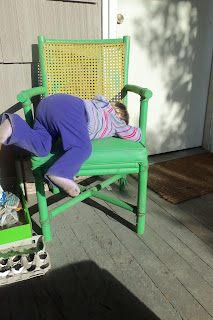Am I a good guesser?

Educated Moms Better at Predicting Baby's Sex
Can a pregnant woman determine the sex of her baby by dangling her wedding ring by a string over her abdomen and noting which way it swings? Or if a woman is carrying her baby high, does that mean it's a boy? Since photographing the fetus with ultrasound is a relatively new technology, expectant mothers have traditionally had to rely on a mishmash of folkloric maxims to try to determine their babies' sex. But do the old ways hold water?
No, say researchers at the Johns Hopkins School of Public Health, who found that the traditional maxims women have used to predict the gender of unborn babies are no more accurate than mere guessing. The scientists did find, however, that mothers-to-be with more than 12 years of education were far more accurate than less educated women at predicting their baby's sex. What's more, the women in the more-educated group were more likely to base their gender predictions on dreams or feelings, and these types of predictions were the most accurate. The study appeared in the September 1999 issue of the journal Birth.
To put the traditional techniques to the test, the investigators asked 104 pregnant women to use whatever method they liked -- folk adages, dreams, hunches -- to guess the sex of their babies. Overall, the mothers-to-be guessed correctly 55 percent of the time -- a rate no better than mere guesswork could provide. Women with more than 12 years of education, however, were right 71 percent of the time -- a rate outside the statistical boundaries of chance. In contrast, the group with less education correctly predicted their fetuses' sex only 43 percent of the time, well within the realm of chance.
The scientists were at a loss to explain an education-based difference for a subject not directly related to one's educational attainment. Deborah Perry, a doctoral student at the Johns Hopkins School of Public Health who did the formal statistical analysis of the data, noted that "as researchers, we must confess to being perturbed by the better validity of guesses based on dreams and emotions, as compared to those with some biologic plausibility," and cautions that the findings are based on a fairly small sample of around 100 women. Adds senior author Janet DiPietro, PhD, associate professor, Population and Family Health Sciences, "Although predictions of the middle-class group were statistically better than chance, individual women who feel sure of their baby's sex before birth should not be painting the nursery blue or pink just yet."
"http://www.jhsph.edu/PublicHealthNews/Press_Releases/PR_1999/predict_baby_sex.html"
Public Affairs Media Contacts for the Johns Hopkins Bloomberg School of Public Health: Tim Parsons or Kenna Brigham @ 410-955-6878 or paffairs@jhsph.edu.

I'm blaming being over-educated on totally failing to predict Z's sex. Maybe the super powers cap off at a bachelor's?
ReplyDelete